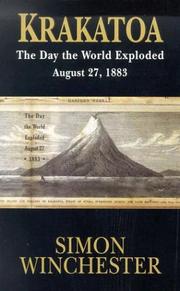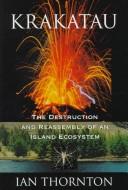| Listing 1 - 3 of 3 |
Sort by
|

ISBN: 0786257296 9780786257294 Year: 2003 Publisher: Waterville, Me. : Thorndike Press,
Abstract | Keywords | Export | Availability | Bookmark
 Loading...
Loading...Choose an application
- Reference Manager
- EndNote
- RefWorks (Direct export to RefWorks)
Chronicles the causes, devastation, and lasting effects of the cataclysmic 1883 eruption of the volcano island Krakatoa in what is now Indonesia.
Volcanoes --- Volcans --- History --- Histoire --- Krakatoa (Indonesia) --- Krakatoa (Indonésie) --- Eruption, 1883. --- Eruption, 1883
Book
Year: 1890 Publisher: Paris : C. Marpon : E. Flammarion,
Abstract | Keywords | Export | Availability | Bookmark
 Loading...
Loading...Choose an application
- Reference Manager
- EndNote
- RefWorks (Direct export to RefWorks)
Krakatoa (Indonesia) --- Krakatoa (Indonésie ; volcan) --- Volcanic eruptions. --- Éruption (1883) --- Éruption

ISBN: 0674505689 9780674505681 9780674505728 0674505727 Year: 1996 Publisher: Cambridge, Mass. Harvard University Press
Abstract | Keywords | Export | Availability | Bookmark
 Loading...
Loading...Choose an application
- Reference Manager
- EndNote
- RefWorks (Direct export to RefWorks)
On August 27, 1883, the island of Krakatau in the Sunda Strait near Java erupted with a force nearly ten thousand times that of the atom bomb dropped on Hiroshima in 1945. Two-thirds of the island disappeared. When the pall of ash lifted, the toll in human lives stood at nearly 37,000 and more than 160 villages had been wiped away without a trace. All plant and animal life on Krakatau was obliterated. Nine months after the explosion, a French expedition searching for signs of life discovered a single spider that had crossed to the island on a balloon of silk. Life had returned to Krakatau. Scientists have been studying the island ever since. After the eruption, Krakatau provided a unique opportunity to study the colonization of a sterile area by plants and animals across a sea barrier and the gradual incorporation of the newcomers into the developing ecosystem. Krakatau: The Destruction and Reassembly of an Island Ecosystem is a comprehensive account of the reassembly of a tropical forest ecosystem over the past century. Ian Thornton tackles the many questions and controversies surrounding the eruption and its aftermath. He writes, "The natural healing process has followed the most extreme form of ecological destruction possible, total biological extirpation. Yet the islands surviving the 1883 eruption are covered in secondary forest, and over 200 species of plants, 70 species of vertebrates, and thousands of invertebrate species now inhabit these forests."
Island ecology --- Krakatoa (Indonesia) --- Krakotoa (Indonesia) --- Eruption, 1883. --- Krakotoa (Indonesia). --- Island ecology - Indonesia - Krakatoa. --- Ecology --- Environmental monitoring --- Volcanic eruptions --- Environmental Monitoring --- Volcanic Eruptions --- Volcanic Ash --- Volcanic Eruption --- Volcanic Gases --- Ash, Volcanic --- Eruption, Volcanic --- Eruptions, Volcanic --- Gases, Volcanic --- Environmental Surveillance --- Monitoring, Environmental --- Surveillance, Environmental --- Wastewater-Based Epidemiological Monitoring --- Environmental Restoration and Remediation --- Ecological Parameter Monitoring --- Bionomics --- Ecologies --- Environmental Psychology --- Conservation of Natural Resources --- Environmental Health --- Ecosystem --- Volcanoes --- Natural disasters --- Volcanism --- Biomonitoring (Ecology) --- Ecological monitoring --- Environmental quality --- Applied ecology --- Environmental engineering --- Pollution --- Balance of nature --- Biology --- Ecological processes --- Ecological science --- Ecological sciences --- Environment --- Environmental biology --- Oecology --- Environmental sciences --- Population biology --- Eruptions --- Measurement --- Monitoring --- Krakatao (Indonesia) --- Krakatau (Indonesia) --- Rakata (Indonesia) --- Insular ecology --- Islands
| Listing 1 - 3 of 3 |
Sort by
|

 Search
Search Feedback
Feedback About
About Help
Help News
News